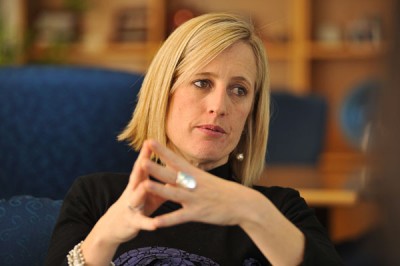CHIEF Minister Gallagher has blogged her speech to the Assembly’s Gough Whitlam condolence motion. Here’s what she had to say:
Madam Speaker, the entire Australian nation has been moved this week by the news of Gough Whitlam’s passing.
It has brought grief from Gough’s home in the eastern suburbs of Sydney, to Indigenous Australians in communities around Australia and to Canberra – as our city and the backdrop to much of Gough’s remarkable life.
In the Australian Labor Party we are mourning the loss of a Labor hero.
It has been shown that in death, as in life, this visionary leader has the power to emote and to inspire.
The past few days have seen an abundance of eulogies of those who knew Gough well – their admiration impossible to convey in words alone.
These accounts have come from Gough’s political contemporaries – both friend and foe – from present day leaders, the media fraternity and Gough’s closest friends and family.
Some of the most enlightening and moving comments have come from those whose politics were not those of Gough, which itself shows the reach of his grand stature and personality.
It seems that nobody who came in contact with Gough walked away unaffected. There were no neutral feelings about this man, but even those with whom he fought the fiercest battles have praised his contribution to Australia this week.
All sides have praised his courage, his vision, his reforming instincts – both for the Labor Party and the country – and his parliamentary style. In each of these qualities, Gough had very few peers.
Putting these fine qualities aside, I believe what sets Gough apart from other leaders of modern Australian history is shown in the outpouring of emotion from everyday Australians.
This week thousands of Australians have expressed their thanks for the opportunities given to them and their families by Gough Whitlam’s program of reforms:
- those who could access healthcare without the fear of financial disaster, thanks to the first national health insurance scheme
- those who made it to university on merit and have gone on to careers they never thought possible, thanks to the reform of school funding and removal of university fees
- women who, for the first time, had a Prime Minister vigorously defending them as equals, who spoke up for them on reproductive rights and issues like contraception
- Indigenous Australians who, for the first time, had a Prime Minister determined to end racial discrimination, deliver them equal rights and govern for them as equals in their own country. Who can forget that incredibly significant moment at Wave Hill station in 1975 with Gough and Vincent Lingiari and the symbolic return of the land to the Gurindji people, and the capturing of that event through Paul Kelly and Kev Carmody’s famous song, From Little Things Big Things Grow.
The list of reforms was incredibly long – in the 47-page ‘It’s time’ speech of 1972, some 200 promises were made, and most of them kept.
But for all the fury of the time, little of the Whitlam program seems radical today.
And here lies, I believe, the true Whitlam legacy.
Gough brought what had often been considered dangerous ideas into the Australian mainstream and welded them onto our value system.
In 1969 he said this to the national Labor conference:
When government makes opportunities for any of the citizens, it makes them for all the citizens. We are all diminished as citizens when any of us are poor. Poverty is a national waste as well as an individual waste. We are all diminished when any of us are denied proper education. The nation is the poorer – a poorer economy, a poorer civilisation…
Today in politics we argue over elements of these ideas but few disagree with those core principles.
They are entrenched in the Australian identity – in our concept and understanding of fairness – and their presence there is assured even now that we have lost their great champion.
The true challenge now, for those of us privileged to reach elected office, is to honour the legacy of positive change for which Gough Whitlam will always be remembered.
His life has taught Australia not to fear reforming governments and social democratic principles. On the contrary, these are some of the great qualities which set Australia apart from other nations.
This is one reason Gough’s death is being felt so heavily in the Labor Party – he was a giant of the movement.
As with everything else, he was always willing to shake things up to achieve the changes he wanted, but the party would come to owe him for it.
He changed Labor from what he described as ‘Australia’s largest pressure group’, into an election-winning force and a transforming national government.
He attracted a young and revived membership, from which has been drawn much of the party’s senior leadership today.
And while his own government was short-lived, the experience of the Whitlam government would greatly inform the success of great reforms made by Labor Prime Ministers since.
Gough’s visionary diplomacy with the People’s Republic of China is another aspect of this program, and has been high on my mind having been in China just last week.
Gough saw the need to normalise relations with China a full two decades before he achieved it – and before he convinced the Labor Party to adopt it as policy.
He led the western world in repairing Australia’s relationship with China. Indeed, he showed that Australia could be a leader in the world.
As he did so, he confronted head-on the malaise of community attitude in much of Australia at the time. Written in the face of this sentiment and a full-blown attack from the McMahon government in Canberra, this passage was sent from Whitlam in China:
The real test of success of our mission lies not with us but with the Australian people. It all depends upon whether Australia is mature enough and self-confident enough to face squarely the facts of life in our region.
The really serious aspect of Mr McMahon’s outburst is that it rehashes all the old slogans which passed for foreign policy in the fifties and sixties. We must either grow up or fossilise…[1]
The anecdotes and stories which further illustrate his legendary turn of phrase have seemed almost never-ending in this week of reflection.
One of the lesser known aspects of Gough Whitlam’s life was his deep connection to Canberra.
He remains the only Prime Minister to have spent his formative years here, attending Telopea Park School and Canberra Grammar.
He maintained long and enduring links with the Australian National University including, among other things, the six months immediately following his dismissal as Prime Minister when he and Margaret lived at University House.
Gough worked in the Department of Political and Social Change at the ANU from 1978 to 1980 and in 1982 Gough became an Honorary Fellow of University House.
I’m proud to say he is also a past member of my first Labor party sub-branch, Canberra South.
Perhaps due to this Canberra connection, Gough was also a Prime Minister who believed in this city as a great national capital.
One vital reform to take place in the joint sitting of parliament after the 1974 double dissolution election was to give the territories representation in the Senate.
His establishment of the Australia Council for the Arts and the National Gallery were further steps from which our city and our country have benefitted ever since.
Both Gough and Margaret’s contributions to the social fabric of the city – at a time when it was barely recognisable to what we know today – has been fondly remembered in Canberra this week.
Margaret was a fine advocate for the arts, the disadvantaged and for community life in the nation’s capital.
Last year we were able to name the beautiful new pavilion at the National Arboretum after Margaret Whitlam.
With Gough’s passing we will seek to honour his memory appropriately in this city as well.
As a place with so many students of political history, I have no doubt the community will give us plenty of guidance on what they see as the appropriate ways to do this – as they have already begun to do.
Madam Speaker, I’m very proud to move this motion which records the Legislative Assembly’s deep condolence to the Whitlam family and the recognition of a great leader and visionary.
We have lost a great Australian, but the national outpouring of grief has brought with it a reaffirmation – perhaps a regeneration – of the principles he stood for.
In death – as in life – there can be no silencing of such a towering figure in Australia’s modern history.
Gough Whitlam’s legacy lives on in the millions of lives he touched.
Who can be trusted?
In a world of spin and confusion, there’s never been a more important time to support independent journalism in Canberra.
If you trust our work online and want to enforce the power of independent voices, I invite you to make a small contribution.
Every dollar of support is invested back into our journalism to help keep citynews.com.au strong and free.
Thank you,
Ian Meikle, editor





Leave a Reply